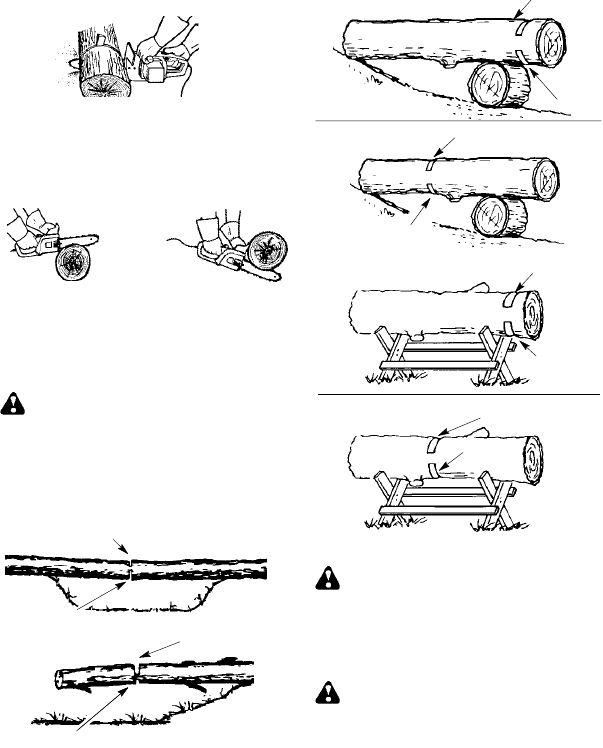
10
reen terthecut. Do notusea met alwedge.
Do n ot at tempt to rest art your saw when it
is pinched or hung i n a log.
Turn saw OFF and use a plastic or
wooden wedge to force cut open.
Use a wedge to remove pinched saw .
Overcutting begins on the top side of
the log with the bottom of the saw
against the log. When overcutting use
light downward pressure.
Overcutting
Undercuttin
g
Undercutting involves cutting on the
underside of the log with top of saw
against the log. When undercutting use
light upward pressure. Hold saw firmly
and maintain control. The saw will tend
to push back toward you.
WARNING: Neverturn sawupside
down to undercut. The saw cannot be
controlled in this position.
Always make your first cut on the com-
pression side of the log. The compres-
sion side of the log is where the pressure
of the log’s weight is concentrat ed.
First cut on compression side of log
Second cut
First cut on compression side of log
Second cut
BUCKING WITHOUT A SUPPORT
S Overcut through
1/3 of the diameter of
the log.
S Roll the log over and finish with a sec-
ond overcut.
S Watch for logs with a compression
side. See illustration above for cutting
logs with a compression side.
BUCKING USING A LOG OR
SUPPORT STAND
S Remember your first cut is always on
thecompressionsideofthelog.(Refer
to the illustrations for your first and
second cut)
S Your first cut s hould extend
1/3 of the
diameter of the log.
S Finish with your second cut.
1
st
Cu
t
2
n
d
Cut
Usingalogforsupport
2
nd
Cut
1
st
Cut
1
st
Cut
2
nd
Cut
Using a support stand
1
st
Cut
2
nd
Cut
LIMBING AND PRUNING
WARNING: Be alert for and guard
againstkickback. Do notallowthe mov-
ing chain to contact any other branches
or objects at the nose of the guide bar
when limbing or pruning. Allowing such
contact can result in serious injury.
WARNING: Never climb into a tree
to limb or prune. Do not stand on lad-
ders, platforms, a log, or in any position
which can cause you to lose y our b al-
ance or control of the saw.
IMPORTANT POINTS
S Watch o ut for springpoles. Spring-
poles are small size limbs which can
whip toward you or pull you off bal-
ance. Use extreme caution when cut-
ting small size limbs.
S Be alert for springback from any
branches that are bent or under pres-
sure.Avoidbeing struckby thebranch
or the saw when the tension in the
wood fibers is released.
S Frequently clear b ranches out of the
way to avoid tripping over them.


















